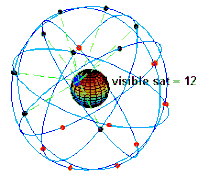User:Trt73520/Commercial use of space
| This is the sandbox page where you will draft your initial Wikipedia contribution.
If you're starting a new article, you can develop it here until it's ready to go live. If you're working on improvements to an existing article, copy only one section at a time of the article to this sandbox to work on, and be sure to use an edit summary linking to the article you copied from. Do not copy over the entire article. You can find additional instructions here. Remember to save your work regularly using the "Publish page" button. (It just means 'save'; it will still be in the sandbox.) You can add bold formatting to your additions to differentiate them from existing content. |
Article Draft[edit]
Lead[edit]
This article is about general computer security and space-related commerce which is related to the commercial use of space. For entrepreneurial space ventures and colonization, see Private Spaceflight. For law related to space use Space law. For treaties related to space use Outer Space Treaty. For the Wikipedia project related to spaceflight use. Wikipedia:WikiProject Spaceflight.
Article body[edit]
Computer Security[edit]

A space system,[1] space vehicle[1], or Satellite is a remotely controlled and monitored computer system or Cyber-physical system(CPS) object which is intentionally placed in orbit in outer space. Computer security, cybersecurity (cyber security), or information security refers to the protection, detection, and deterrence of cyberattack or exploitation of a computer system from unauthorized access or exceeding authorized access in order exploit, deny, or degrade said system. Outer space is an extreme and hazardous environment to remotely operate computer controlled space systems which are traveling at great speeds as they orbit the Earth.[2] This type of remotely operated computer system is also categorized as Cyber-physical system, or SCADA system, or operational technology system, and the protection of such systems is known as CPS security, SCADA security, or OT security [3]. These CPS space assets are also considered to be an Edge computing system which imbeds the computational processes and data storage directly onto the vehicle. Edge computing is designed to conduct the majority of it sensor collection, computational analysis, and physical actions on the device or in this case the space asset. This edge computing processing is designed to reduce the size of data transmissions and required bandwidth. As space vehicles or satellites are designed to be a remotely controlled and monitored computer systems traveling in orbit at great velocities it is extremely important to ensure the security of these systems. The commercial use of space is becoming more prevalent as cost of spaceflight, launches, and vehicles become more affordable which will result in the increase in the number of vehicle in orbit. As the number of space vehicles increase so does the number of potential targets for computer misuse, exploitation, cybercrime, hacktivism, and cyberwarfare by state, non-state, and independent hackers, and their devastating impact[4]. GPS Satellite Constellation[5] figure courtesy of the Wikimedia Commons.
References[edit]
- ^ a b Martin, Johnathon W. (2021). U.S. Space policy Reference Manual : An Anthology of National Space Policies and Other Space Policy Documents. Michael S. Dodge (First edition ed.). Lexington, Kentucky: Mammoth Publishing. ISBN 978-1-0778-9716-8. OCLC 1275388524.
{{cite book}}:|edition=has extra text (help); URL–wikilink conflict (help)CS1 maint: date and year (link) - ^ Oakley, Jacob G. (2020). Cybersecurity for Space. Apress. pp. 19–20. doi:10.1007/978-1-4842-5732-6. ISBN https://doi.org/10.1007/978-1-4842-5732-6..
{{cite book}}: Check|isbn=value: invalid character (help); External link in|isbn= - ^ Ginter, Andrew (2016). SCADA Security: What's broken and how to fix it (in eng). Calgary: Abterra. p. 3. ISBN 978-0-9952984-1-5.
{{cite book}}: CS1 maint: unrecognized language (link) - ^ Dawson, Linda (2018), Dawson, Linda (ed.), "Life Without Satellites", War in Space: The Science and Technology Behind Our Next Theater of Conflict, Cham: Springer International Publishing, pp. 1–11, doi:10.1007/978-3-319-93052-7_1, ISBN 978-3-319-93052-7, retrieved 2023-04-05
- ^ Wikipedia, El pak at English (2007-12-07), English: A simulation of the original design of the GPS space segment, with 24 GPS satellites (4 satellites in each of 6 orbits), showing the evolution of the number of visible satellites from a fixed point (45°N) on earth (considering "visibility" as having direct line of sight)., retrieved 2023-04-05
